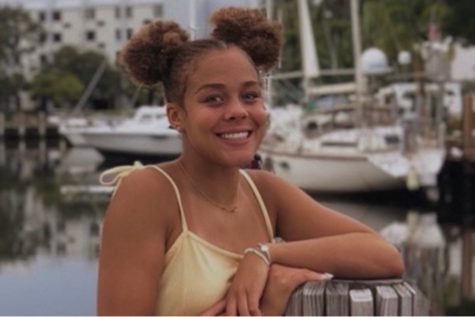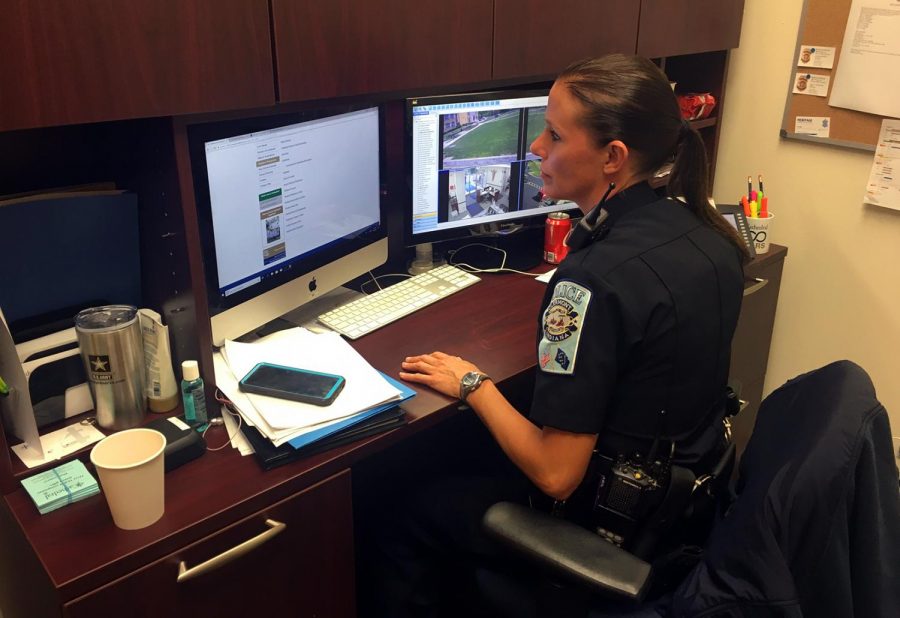Meet our new school resource officer
Emenaker brings wealth of experience to campus
School resource officer Tabetha Emenaker is now part of the Cathedral family.
Ms. Tabetha Emenaker (or Officer Tabby as many students now refer to her) is the school’s first-ever resource officer. She brings a great deal of experience and expertise to campus, as she’s worked for various police departments in Indiana and has trained in different fields of police work.
That training includes the programming from the National Association of School Resource Officers. She has also been part of the crisis intervention team and verbal de-escalation training.
Officer Tabby also has completed the Indiana Law Enforcement Academy and worked for what at the time was referred to as the Indianapolis Police Department (now referred to as the Indianapolis Metropolitan Police Department). She went to the academy in September 1998, almost 20 years ago, then served as a Marion County deputy sheriff for four years. Then she went to Clermont in 2008 and worked as an officer for that department, where she was named the Officer of the Year in 2013.
During the third week of school, Officer Emenaker answered questions about her job as the school resource officer.
How do you like working as Cathedral’s new SRO?
“I like it a lot. It’s quite a different environment for me , (and not just because it is) only the students but the staff,” she said.
Officer Tabetha Emenaker previously worked in public schools, most recently Washington Township, before coming here. “One of the biggest things that I’ve noticed is there seems to be a lot more civility,” the officer said.
What is the job description of an SRO?
“We’re police officers, so our main objective is the safety and security of the students, staff and the property. But we also build relationships with students and the parents,” she said, and added that she can be a resource to students as well. She can offer advice or be there for a student to talk to, but not just as a police officer. “Sometimes I get what I call my ‘extra attention kids’ and that doesn’t necessarily mean there has been something negative that has occurred. Sometimes there are issues where a student may need to be redirected, whether it’s morally or ethically, or just needs some advice, but sometimes I get kids who just like having interactions with me because I’m a police officer,” Officer Tabby said.
She’ll be there for teenagers who may not feel comfortable talking to their parents.
“(The kids) get older and they want to get their independence from their parents. So they do certain things but they’re not real sure, so they don’t want to go back to mom and dad and ask them because it’s like saying ‘I wasn’t ready to be independent.’ So then sometimes they’ll come to me and ask me for advice, and that’s between us.”
She also asks the parents to let her know that if there’s anything they need concerning their sons or daughters. “It’s almost like a mutual co-parenting relationship in a way,” she said.
She’s also taken training involving verbal de-escalation, which gives her insights and abilities to identify when a person may have emotional needs. “I have (two) children myself. I have a daughter who’s 23, and she does have some medical special needs — she has epilepsy — which affects her neurological system. So that’s taught me a lot of different aspects of seeing things when people are having some issues medically that it can affect their neurological system.”
Have you always wanted to have a career in law enforcement?
“Yes, since I was 5.” She said she remembers the exact moment when she decided that she wanted to be a police officer. A boy about her age was being bullied because of his race by some older kids who were throwing rocks at him. She stood in front of him trying to protect him from being hurt. “It really upset me, and that’s when I decided I wanted to be there for people.”
Her father was in the military so she would move around a lot. “It’s exposed me to very different diversified environments and different people. I’ve lived out of the country before, and so I’ve experienced what it’s like to be ‘outsider.’”
When she lived in Keflavík, Iceland the people there wouldn’t talk to her and her family for three months, “so I know what it’s like to feel like they don’t want you there,” Officer Tabby said, “and eventually they spoke to us, but it was tough.”
Why do you like serving as a police officer?
“(I like) being there for people who don’t normally expect it. I had a woman one time when I went on a police run and she looked at me and she goes, ‘Why do you even care?’ and I know the look on my face; I looked puzzled. And so I said, ‘I think you’re asking the wrong question.’
I think the question should be do I really have a reason not to care,” Emenaker said.
Just because she doesn’t know someone, doesn’t mean that she doesn’t care about them or won’t go out of her way to help them.
“Sometimes I think when people think why do I even care, it’s almost like somewhat of a moral decay in society. We don’t take the time to get to know people or even notice their needs by looking at their physical reaction or the look on their face to see that they’re in need of something,” Emenaker said. “It’s OK to help someone you don’t even know because that’s being selfless.” That’s what being a police officer is all about, she said.
What do you think are the most crucial safety procedures to have in place in our schools today?
“Obviously the structures of the buildings, getting to know the students. I’ve had to go through active shooter training multiple times. We continuously go through training on that and it has changed over the years,” she said.
During Columbine, for example, officers stayed outside of the school to organize their entry into the building. Now police officers are trained to go into the schools immediately and to try to take down the shooter.
Her Number-1 priority is keeping the students and the staff safe, even while knowing she may not make it out of an emergency situation, “You’ve got to learn that in my position I’m the first one to call, and there always does lie the possibility that I may not make it out, but that’s the reality of it. I didn’t go into law enforcement not understanding that.”
Having those possibilities, though, doesn’t make Officer Tabby want to stop what she’s doing.
It’s important for her to know the students and staff as well as everyone who enters the campus.
She needs to know the geographical layout as well, which may be a little more of a challenge on this campus with its three buildings as opposed to the typical high school’s one structure..
“Statistically if there is a security issue like an armed assailant, the majority of the time it’s going to be someone who’s frequently here and it’s usually not a stranger,” Emenaker said. She’ll walk around throughout the day and check out the property and get to know the students and check inside the buildings.
“We have a system within law enforcement called ‘Digital Sandbox,’ about 400 IMPD officers have access to it now and most of all a lot of the supervisors do,” so if something happened, someone could pull up the blueprints of the property. She also works closely with local law enforcement. As a result, if an incident is occurring at a nearby location, such as Lawerence Central, a bank or an apartment complex, she will know immediately and can put security measures into place right away.
“Also, Cathedral now welcomes any IMPD officers to do walkthroughs of the property to get them familiar with the campus in case there ever is a situation where they would have to respond to an emergency.”
What are your goals for this school year?
“Obviously the safety of the school, making sure it’s secure. I need to make sure I build relationships with the students so they feel comfortable with me. I think approachability is a huge factor,” Emenaker said. She also said that sometimes when people see the uniform and badge they see only an authority figure rather than a resource to go and talk to if you need help.
Do you think Cathedral is a safe environment considering the new rules put in place?
“I think it’s a work in progress. We’re working on it. There are other concerns because it is an open campus,” Emenaker said. The school holds safety meetings, and they’re sending Officer Tabby to School Safety Specialists training in October. After she completes that program, then she’ll move up to the advanced course. She’ll use what she learned and bring it back to campus to help make the campus safer, she said.
How has your year gone so far overall?
“It’s been pleasant. I get a lot of curious looks, and I try to say ‘hi’ to a lot of people so they don’t give me this look like I’m a porcupine,” Officer Tabby said. “It’s been a good transition.”
Over the summer she attended School Resource Officer training and she thought it was very interesting, informative and helpful. The program was offered under the auspices of the National Association of School Resource Officers. “Every year we have a conference that we go to that lasts five or six days and it’s out of state. It’s basically so we can take courses, see what’s going on with the other school districts and it’s nationwide.”

Ava Amos is a senior and is the co-editor-in-chief of the Megaphone staff. She is a member of the varsity softball team and enjoys volunteering with the...







